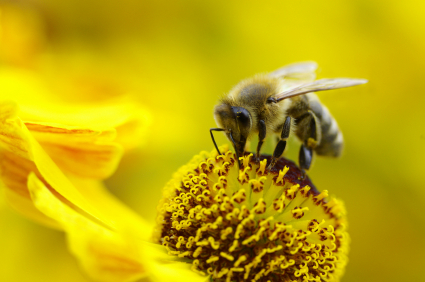 The EPA has posted its response to the controversy over a leaked document regarding clothianidin, Bayer’s widely used blockbuster pesticide that has come under suspicion as a primary cause of the mass honeybee die-off known as colony collapse disorder. (For a full telling of the long, checkered story of EPA’s approval of clothianidin, see my story from two weeks ago.) Here’s what the EPA has to say:
The EPA has posted its response to the controversy over a leaked document regarding clothianidin, Bayer’s widely used blockbuster pesticide that has come under suspicion as a primary cause of the mass honeybee die-off known as colony collapse disorder. (For a full telling of the long, checkered story of EPA’s approval of clothianidin, see my story from two weeks ago.) Here’s what the EPA has to say:
EPA recently received a letter from the National Honey Bee Advisory Board and other organizations requesting that the Agency remove clothianidin from the market. That letter and subsequent press coverage contain several erroneous statements. Reports that a clothianidin honeybee field study is a “core” study (that is, a study routinely required to support the registration of a pesticide) are not true. Further there is confusion about the review status of the study.
EPA scientists routinely reevaluate studies to determine whether the information submitted is valid and if it is relevant or useful to the regulatory matter in question (in this case a request for a new use). While this study was thought to be invalid as cited by the above groups, EPA reevaluation of the study determined that it contains information useful to EPA’s risk assessment. This field study revealed the majority of hives monitored, including those exposed to clothianidin during the previous season, survived the over-wintering period.
OK, the agency has failed to address any of the concerns about the Bayer study — including those raised by its own scientists in the leaked document (PDF). Staff scientists Joseph DeCant and Michael Barrett stated clearly that “deficiencies” in the study had caused them to downgrade its status from “accepted” to “supplemental.”
If the agency wants to reestablish itself itself as a protector of the environment — and not a guardian of corporate interest at the expense of the environment — it needs to explain precisely what those deficiencies were; why the study’s status was downgraded; and, given that its status was downgraded, on what basis the agency is still allowing Bayer to sell clothianidin.
As for the bit about how the Bayer-funded study isn’t “core” to clothianidin’s registration, the agency needs to explain how that can be so, given that in public documents about the pesticide, the agency repeatedly stated that the pesticide’s registration was contingent on acceptance of Bayer’s life-cycle study.
In reporting this story, I have not succeeded in talking to anyone at the agency above the rank of press officer. Now the holidays are upon us. In the new year, I plan to be a bee in the agency’s bonnet, buzzing around until I can get someone to answer these questions on the record.
Bayer issued a very similar non-response to the controversy on its website a few days ago. We can count on corporations to dodge hard questions in pursuit of profit. But we expect and deserve more from our publicly funded watchdogs.



